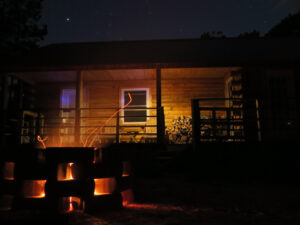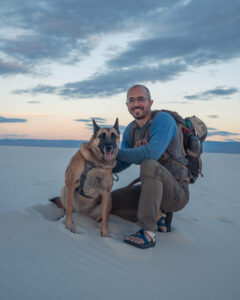During the Fall 2004 Montana Afoot & Afloat course, I saw the quote “Live to Learn, Learn to Live”
over the entrance to a school in Great Falls, Montana while we were driving through. I was a
student then and the course at the time was a remarkable experience—hiking and paddling
through Montana, meeting all kinds of people of the Montana landscape—and has over the
nearly 20 years since continued to serve as a lodestar in providing a bearing and charting my
path. No question a winding, work-in-progress, through-the-weeds kind of path with wrong
turns and washed out, muddy areas with some sunnier, firmer ground woven in.
Being out in the landscape, combined with the coursework and meeting people, WRFI courses
teach you a number of things: the importance of getting out in the world and experiencing it,
the value of being uncomfortable mentally and physically, the need for being practical and
having common sense, understanding and learning from others, putting yourself in another’s
shoes, and having a combination of respect, gratitude (including for a hot meal on a cold night
in the mountains), confidence without arrogance—humility, humor (one of those hot meals
was not-fully-cooked-beans by me and caused us to gas ourselves out of our own tents later on), and resolve. WRFI courses connect the gaps – those interstices between book and firsthand, on-
the-ground learning – like reading about the Hardrock Mining Law of 1872 and seeing and learning about hardrock mining sites in person, and then writing my Congress members on the
subject.
I live in an off-grid cabin in the woods in the Cumberland Plateau, a fundamental aspect for my
path that really began when writing my Land Ethic final paper we all did for the Afoot & Afloat
course. I rely on lithium-ion batteries and solar panels for power, knowing that minerals were
mined for both, and I wouldn’t have electricity here but for that fact. My heat source for my
cabin is a 515-pound wood burning stove handmade and crafted in Vermont that uses
soapstone millions of years old in it to retain heat to then evenly release that heat over time—
this stove has taught me much. As with a new cast iron skillet, seasoning or tempering my cast
iron wood stove when it was new allowed me to build up the heat intensity over time, taking on more
and bigger challenges in life. Through trial and error over several winters here, I’ve learned
which kinds of woods I like best depending on how intense I want the fire or how long I’m
wanting the wood stove to be churning out heat—I’ve learned to adjust and adapt and fine-tune the process, as I have with life. I’ve watched many fires go from a low burn to full blast just by a
small tweak in how the logs rest on each other, increasing airflow between them—giving me
that resolve to continue working on myself.


I live on land where I’ve come across some of the most astounding salamander and bee species
I had never seen, arrowheads, a Civil War bullet, a rusted out moonshine still by the creek from
the Prohibition era, where coal and amber mining and tree harvesting occurred. I’m trying to
have an understanding of the human and ecological history of this land that comes up under
my feet in the mud after a rain and that I see remnants of above ground and figure out what I
want to do during my time with it. Ultimately, my aim is living to learn, and learning to live in a
manner that reflects a genuine appreciation for and reflection of the fact that I’m part of a
much bigger narrative, and to act on that realization. WRFI got the wood stove burning on that path for me—one that now looks to combine law, art, and blacksmithing work—and I hope it
does for you too, wherever your bearing points.
Andrew Beckington is a WRFI alum who participated in Montana Afoot and Afloat in 2004. He has described the experience as being a ‘watershed moment’ for him, and since the course has worked as an environmental lawyer, naturalist educator, and connected community member. Andrew continues to support the work WRFI does connecting humans and landscapes and is a long-standing donor.

One Reply to “Living to Learn and Learning to Live by Andrew Beckington”
Comments are closed.
Andrew, seeing your name brought a smile to my face. Thank you for sharing your experiences and how WRFI has impacted you. It was heartening to read– which is a gift. I am grateful to have a few of your sparks fly my direction and inspire me.